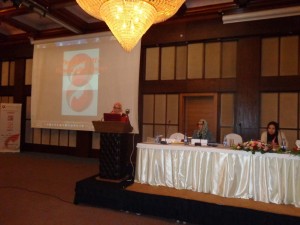By Sami Zaptia.

Tripoli, 23 June 2014:
At a ceremony at the Radisson hotel in Tripoli today, Hope Charity honoured some of the . . .[restrict]newly graduated women in its empowerment programme from its three Tripoli branches in Jraba Street, Al-Hadba and Gurji.
The main purpose of Hope Charity is to empower underprivileged women in Libya by proving women training in various skills that can help provide jobs or products that can provide sustainable economic empowerment.
Ruquya Glesa, Founder and President of Hope Charity said during her speech today that the goal of the organization is “to inspire social economic development for women , promoting their sustainable human development to achieve financial independence in order to reduce women’s isolation and to encourage women to become household income generators.”
“We believe that with knowledge, hope in a better life is increased and we believe that we have a role in change – even if it is a small role”, emphasized Glesa.
“We have proudly helped, since 2011, over 5,000 educated women graduate of which 3,000 have managed to obtain employment in stores, malls, schools, nurseries and clinics”, she proudly explained.
Reviewing the training that the organization has provided over the year, Glesa explained that “Hope Charity works by educating and training women students to access economic opportunities through providing job skills and technical business training. Hope has provided vocational skills to enhance women’s chances of obtaining employment opportunities and to promote income generating activities”.
“These include First Aid training to include providing the elders of the community basic medical aid such as blood pressure measurement and diabetes tests. Another skill provided is basic beauty centre training and beauty centre tools which are provided with the aim of promoting local entrepreneurship”.
“The Hope Charity Widows’ Initiative for Economic Sustainability programme, on the other hand, focuses on sustainable livelihood training for widows. This teaches women participants how to operate a sewing machine and produce wearable and sellable products. Trainees are provided with their own sewing machine with the aim that they are able to build businesses and generate a sustainable livelihood in the future”.
“Whilst the commercial bakery training involves teaching women both cooking and catering skills. Hope established its own commercial kitchen which trainees use to prepare food to cater for the weddings, cafes and restaurants in their community”.
Beyond economic empowerment, the Hope Charity also engages in “political awareness training such as the importance of free political opinion and independent decision-making. Support was also provided for women suffering psychological abuse as a result of Libya’s conservative society such as the prevention of women seeking education and pressures to be confined to a traditional woman’s role”.
“Hope helps to tackle these with the provision of a “quiet room”, providing social counseling and psychological therapy to help build self-confidence, self-reliance and self-esteem”, Glesa concluded. [/restrict]






